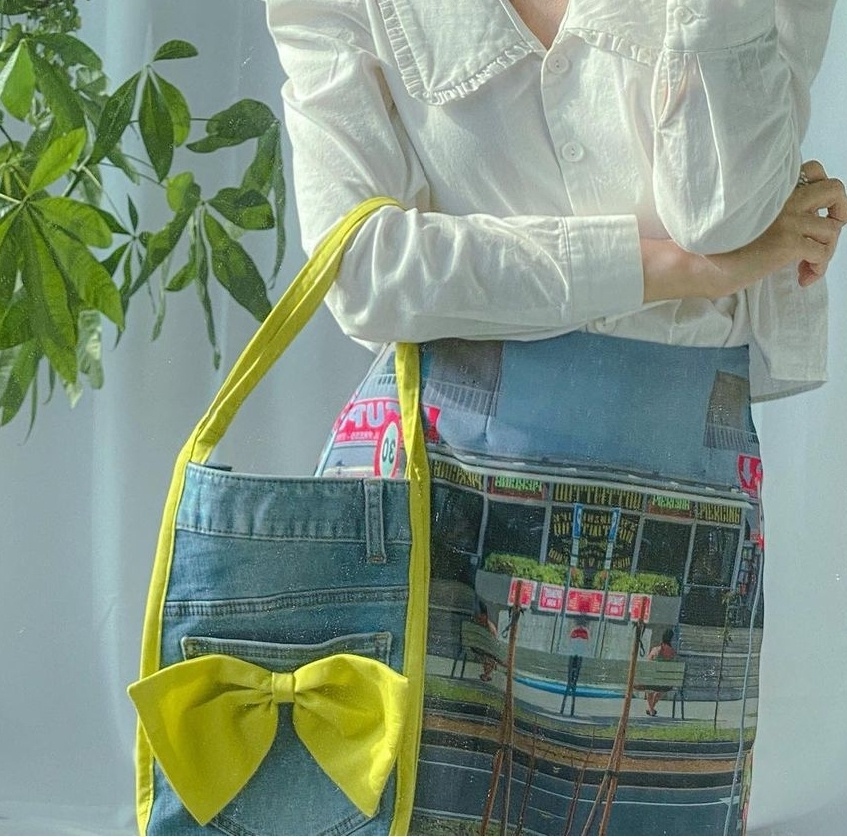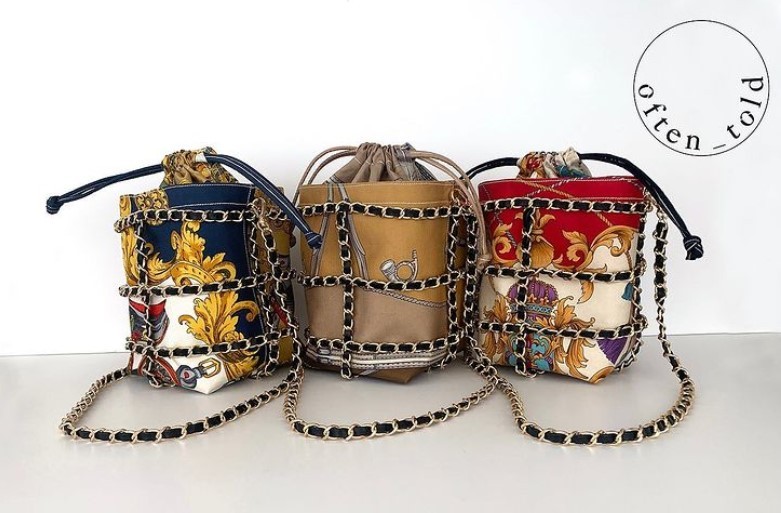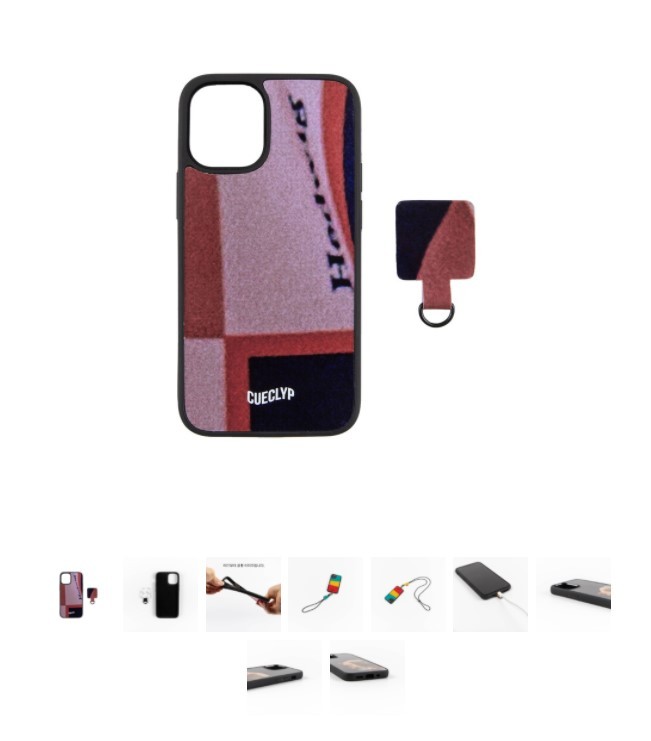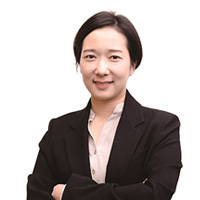
The COVID-19 pandemic has changed our lives in many ways and has also made many people think about the environment, after seeing piles of throwaway face masks and plastic containers from food deliveries.
With that, “upcycling” is gaining renewed attention in the fashion scene. Upcycling involves creating new items using old materials or reusing discarded products.
Kim Byeol-ri, a 22-year-old college student, recently purchased a denim miniskirt and handbag made from an old pair of jeans.
Once a fashion maximalist who preferred extra layers and loud prints, she began to pursue minimal fashion after contemplating her consumption habits during the pandemic times.
“I spend less on my clothes while staying at home with all schedules canceled, which made me think about my consumption habits. I began to think that I want to spend money more meaningfully and ethically,” Kim said. “Many upcycled products are not as cheap as you may think, because they require more effort than mass-produced goods. But I think it’s worth the price in terms of my personal value. And the designs are actually quite beautiful,” she said.
In South Korea, the amount of waste in the first half of last year reached 5,349 tons, a 11.2 percent rise on-year, driven partly by the pandemic. More than 900 million disposable straws from 19 major cafes and fast food restaurants were thrown away, according to the Ministry of Environment.
The country’s conglomerates also have launched upcycling brands. SK hynix in December showcased its label “RE:BUD,” which produces bags and pouches made from discarded school uniforms.
Fashion brand RE;CODE, a subsidiary of Kolon Industries FnC, saw an increase in sales last year after collaborating on projects with foreign fashion brands. The upcycling brand uses fabrics from outdated stock from over three years ago. In August, it collaborated with Nike to produce sweatshirts, shoes and socks using fabric from unsold stock.
With that, “upcycling” is gaining renewed attention in the fashion scene. Upcycling involves creating new items using old materials or reusing discarded products.
Kim Byeol-ri, a 22-year-old college student, recently purchased a denim miniskirt and handbag made from an old pair of jeans.
Once a fashion maximalist who preferred extra layers and loud prints, she began to pursue minimal fashion after contemplating her consumption habits during the pandemic times.
“I spend less on my clothes while staying at home with all schedules canceled, which made me think about my consumption habits. I began to think that I want to spend money more meaningfully and ethically,” Kim said. “Many upcycled products are not as cheap as you may think, because they require more effort than mass-produced goods. But I think it’s worth the price in terms of my personal value. And the designs are actually quite beautiful,” she said.
In South Korea, the amount of waste in the first half of last year reached 5,349 tons, a 11.2 percent rise on-year, driven partly by the pandemic. More than 900 million disposable straws from 19 major cafes and fast food restaurants were thrown away, according to the Ministry of Environment.
The country’s conglomerates also have launched upcycling brands. SK hynix in December showcased its label “RE:BUD,” which produces bags and pouches made from discarded school uniforms.
Fashion brand RE;CODE, a subsidiary of Kolon Industries FnC, saw an increase in sales last year after collaborating on projects with foreign fashion brands. The upcycling brand uses fabrics from outdated stock from over three years ago. In August, it collaborated with Nike to produce sweatshirts, shoes and socks using fabric from unsold stock.

Materials are broadly classified into three categories -- metals, ceramics and plastics -- which can be recycled if they are sorted properly at the time of disposal. They can be good resources instead of waste, said Park Jai-koo, a professor of the department of earth resources and environmental engineering at Hanyang University.
“Nowadays we avoid using the term ‘waste.’ Instead, the concept of resource circulation has widely spread. Sorting is really important when we throw away trash and remove the content like food from the plastic containers,” Park added.
Often_told, a fashion brand that produces bags, hats and clothes using dust bags from luxury fashion brands such as Chanel, Burberry and Hermes, is enjoying growing popularity. The fashion brand, based in southern Seoul, was launched last January. The bags range in price from 400,000 won to 500,000 won.
“There has been a public interest in upcycling, but the pandemic made people more cautious about the environment. More people are showing interest in the message that we have striven to deliver about environmental issues,” said Kim Ka-yoon, who founded the fashion brand.

Lee Yoon-ho, a co-founder of Cueclyp, says prejudices about recycled products -- and there are many, chief among them that they may look old and unfashionable because they are made with “garbage” -- seem to have dissipated recently. The upcycled fashion brand creates items ranging from smartphone cases and wallets to accessories using a variety of materials from discarded umbrellas, ad banners and airbags from scrapped cars.
“We have participated in many flea markets and did pop-up stores since 2016. Even a few years ago, upcycled products were not familiar items to many. I even heard some saying, ‘they are made out of trash,’” Lee said. “But a lot has changed, particularly among young generation who have become more cautious about the environment issue thanks to the pandemic.”
By Park Yuna (yunapark@heraldcorp.com)







![[Graphic News] More Koreans say they plan long-distance trips this year](http://res.heraldm.com/phpwas/restmb_idxmake.php?idx=644&simg=/content/image/2024/04/17/20240417050828_0.gif&u=)
![[KH Explains] Hyundai's full hybrid edge to pay off amid slow transition to pure EVs](http://res.heraldm.com/phpwas/restmb_idxmake.php?idx=644&simg=/content/image/2024/04/18/20240418050645_0.jpg&u=20240419100350)






![[From the Scene] Monks, Buddhists hail return of remains of Buddhas](http://res.heraldm.com/phpwas/restmb_idxmake.php?idx=652&simg=/content/image/2024/04/19/20240419050617_0.jpg&u=20240419175937)

![[KH Explains] Hyundai's full hybrid edge to pay off amid slow transition to pure EVs](http://res.heraldm.com/phpwas/restmb_idxmake.php?idx=652&simg=/content/image/2024/04/18/20240418050645_0.jpg&u=20240419100350)

![[Today’s K-pop] Illit drops debut single remix](http://res.heraldm.com/phpwas/restmb_idxmake.php?idx=642&simg=/content/image/2024/04/19/20240419050612_0.jpg&u=)